表示职业的名词
- 格式:docx
- 大小:12.60 KB
- 文档页数:2
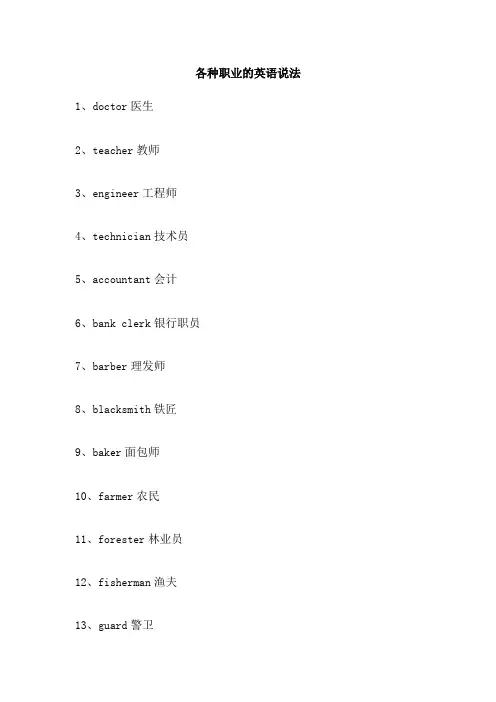
各种职业的英语说法1、doctor医生2、teacher教师3、engineer工程师4、technician技术员5、accountant会计6、bank clerk银行职员7、barber理发师8、blacksmith铁匠9、baker面包师10、farmer农民11、forester林业员12、fisherman渔夫13、guard警卫14、waiter服务员15、waitress女服务员16、carpenter木匠17、taxi driver出租车司机18、spy间谍19、pilot飞行员20、firefighter消防员21、taxi driver出租车司机22、detective侦探23、tailor裁缝24、hairdresser理发师,发型师25、cook厨师职业暴露是指医务人员从事诊疗、护理等日常工作过程中意外被感染性病原体或其具有传染性的病人血液、体液等污染了皮肤或者粘膜,或者被含有病原体或其具有传染性的病人血液、体液污染了的针头及其他锐器刺破皮肤。
坚持预防为主的方针,建立健全各种防医院感染的职业安全制度,规范医务人员的行为,加强医源性感染的预防和控制工作。
加强职业暴露防护知识的宣教,增强医务人员自我防护意识。
执行标准预防措施;有可能接触病人血液、体液的诊疗和护理操作时必须戴手套;操作完毕,脱去手套后立即洗手,必要时进行手消毒。
医务人员进行有可能接触病人血液、体液的诊疗和护理操作时必须戴手套,如果病人的血液、体液可能接触医务人员皮肤,应加穿隔离衣。
医务人员手部皮肤发生破损,在进行有可能接触病人血液、体液的诊疗和护理操作时必须戴双层手套。
认真执行各项消毒隔离制度,遵循消毒隔离原则。
防止病人血液、体液污染环境。
病人血液、体液污染的环境表面及其物品应先喷洒消毒剂,作用一定时间后再进行清洗和擦拭。
严格执行锐器伤防范措施。
对病人使用后的锐器及时毁形;将针头重新套上针帽;分类收集锐器,统一销毁;条件不具备时,可先将其浸泡于消毒液中。
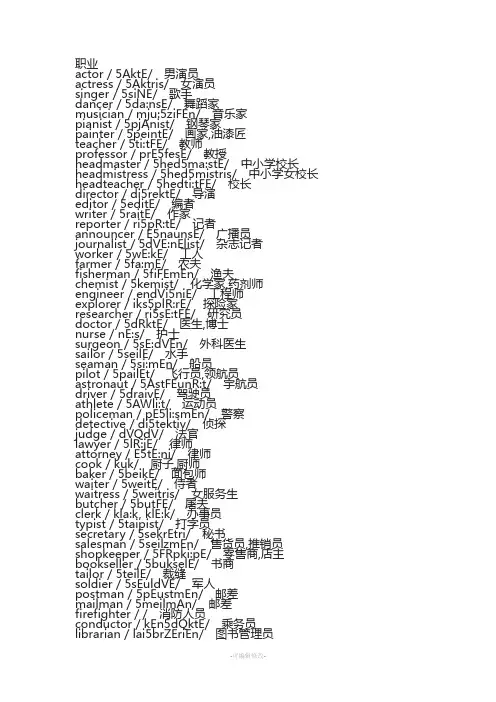
职业actor / 5AktE/ 男演员actress / 5Aktris/ 女演员singer / 5siNE/ 歌手dancer / 5da:nsE/ 舞蹈家musician / mju:5ziFEn/ 音乐家pianist / 5pjAnist/ 钢琴家painter / 5peintE/ 画家,油漆匠teacher / 5ti:tFE/ 教师professor / prE5fesE/ 教授headmaster / 5hed5ma:stE/ 中小学校长headmistress / 5hed5mistris/ 中小学女校长headteacher / 5hedti:tFE/ 校长director / di5rektE/ 导演editor / 5editE/ 编者writer / 5raitE/ 作家reporter / ri5pR:tE/ 记者announcer / E5naunsE/ 广播员journalist / 5dVE:nElist/ 杂志记者worker / 5wE:kE/ 工人farmer / 5fa:mE/ 农夫fisherman / 5fiFEmEn/ 渔夫chemist / 5kemist/ 化学家,药剂师engineer / endVi5niE/ 工程师explorer / iks5plR:rE/ 探险家researcher / ri5sE:tFE/ 研究员doctor / 5dRktE/ 医生,博士nurse / nE:s/ 护士surgeon / 5sE:dVEn/ 外科医生sailor / 5seilE/ 水手seaman / 5si:mEn/ 船员pilot / 5pailEt/ 飞行员,领航员astronaut / 5AstFEunR:t/ 宇航员driver / 5draivE/ 驾驶员athlete / 5AWli:t/ 运动员policeman / pE5li:smEn/ 警察detective / di5tektiv/ 侦探judge / dVQdV/ 法官lawyer / 5lR:jE/ 律师attorney / E5tE:ni/ 律师cook / kuk/ 厨子,厨师baker / 5beikE/ 面包师waiter / 5weitE/ 侍者waitress / 5weitris/ 女服务生butcher / 5butFE/ 屠夫clerk / kla:k, klE:k/ 办事员typist / 5taipist/ 打字员secretary / 5sekrEtri/ 秘书salesman / 5seilzmEn/ 售货员,推销员shopkeeper / 5FRpki:pE/ 零售商,店主bookseller / 5bukselE/ 书商tailor / 5teilE/ 裁缝soldier / 5sEuldVE/ 军人postman / 5pEustmEn/ 邮差mailman / 5meilmAn/ 邮差firefighter / / 消防人员conductor / kEn5dQktE/ 乘务员librarian / lai5brZEriEn/ 图书管理员baby-sitter / / 保姆apprentice / E5prentis/ 学徒工artisan / a:ti5zAn/ 工匠craftsman / 5kra:ftsmEn/ 工匠specialist / speFElist/ 专家employer / im5plRiE/ 雇主,老板receptionist / ri5sepFEnist/ 接待员operator / 5RpEreitE/ 电话接线员interpreter / in5tE:pritE/ 翻译photographer / fE5tRgrEfE/ 摄影师playwright / 5pleirait/ 剧作家linguist / liN5gwist/ 语言学家botanist / 5bRtEnist/ 植物学家economist / i:5kRnEmist/ 经济学家chemist / 5kemist/ 化学家scientist / 5saiEntist/ 科学家philosopher / fi5lRsEfE/ 哲学家politician / pRli5tiFEn/ 政治学家physicist / 5fizisist/ 物理学家archaeologist / a:kiE5lRdVist/ 考古学家geologist / dVi5RlEdVist/ 地质学家mathematician / mAWEmE5tiFEn/ 数学家biologist / bai5RlEdVist/ 生物学家zoologist / zEu5RlEdVist/ 动物学家statistician / stAtis5tiFEn/ 统计学家physiologist / fizi5RlEdVist/ 生理学家futurologist / / 未来学家artist / 5a:tist/ 艺术家composer / kEm5pEuzE/ 作曲家designer / di5zainE/ 设计家sculptor / 5skQlptE/ 雕刻家designer / di5zainE/ 服装设计师model / 5mRdl/ 模特poet / pEuit/ 诗人merchant / 5mE:tFEnt/ 商人stewardess / 5stju:Edis/ 空中小姐porter / 5pR:tE/ 行李夫architect / 5a:kitekt/ 建筑师druggist / 5drQgist/ 药剂师chemist / 5kemist/ 药剂师guide / gaid/ 导游dentist / 5dentist/ 牙科医生supervisor / 5sju:pEvaizE/ 监工THANKS !!!致力为企业和个人提供合同协议,策划案计划书,学习课件等等打造全网一站式需求欢迎您的下载,资料仅供参考。
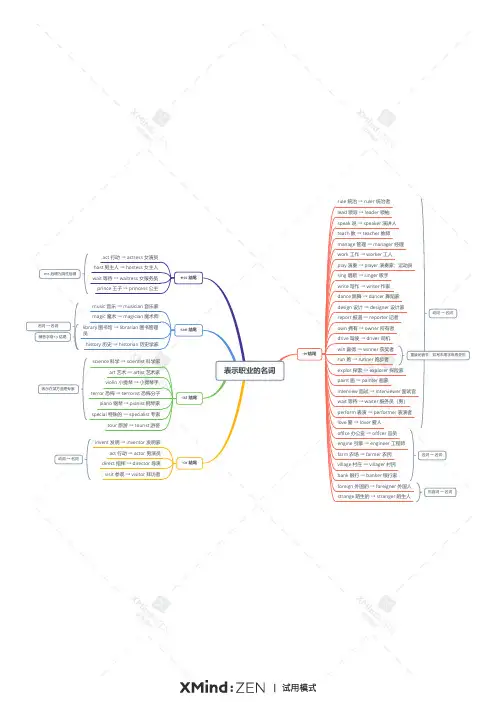
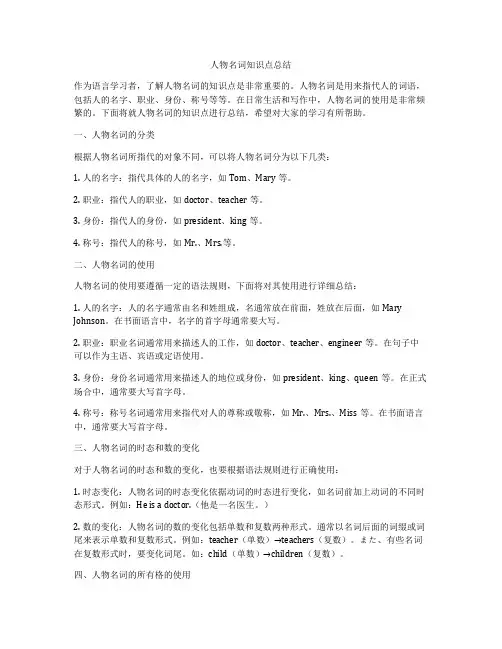
人物名词知识点总结作为语言学习者,了解人物名词的知识点是非常重要的。
人物名词是用来指代人的词语,包括人的名字、职业、身份、称号等等。
在日常生活和写作中,人物名词的使用是非常频繁的。
下面将就人物名词的知识点进行总结,希望对大家的学习有所帮助。
一、人物名词的分类根据人物名词所指代的对象不同,可以将人物名词分为以下几类:1. 人的名字:指代具体的人的名字,如Tom、Mary等。
2. 职业:指代人的职业,如doctor、teacher等。
3. 身份:指代人的身份,如president、king等。
4. 称号:指代人的称号,如Mr.、Mrs.等。
二、人物名词的使用人物名词的使用要遵循一定的语法规则,下面将对其使用进行详细总结:1. 人的名字:人的名字通常由名和姓组成,名通常放在前面,姓放在后面,如Mary Johnson。
在书面语言中,名字的首字母通常要大写。
2. 职业:职业名词通常用来描述人的工作,如doctor、teacher、engineer等。
在句子中可以作为主语、宾语或定语使用。
3. 身份:身份名词通常用来描述人的地位或身份,如president、king、queen等。
在正式场合中,通常要大写首字母。
4. 称号:称号名词通常用来指代对人的尊称或敬称,如Mr.、Mrs.、Miss等。
在书面语言中,通常要大写首字母。
三、人物名词的时态和数的变化对于人物名词的时态和数的变化,也要根据语法规则进行正确使用:1. 时态变化:人物名词的时态变化依据动词的时态进行变化,如名词前加上动词的不同时态形式。
例如:He is a doctor.(他是一名医生。
)2. 数的变化:人物名词的数的变化包括单数和复数两种形式。
通常以名词后面的词缀或词尾来表示单数和复数形式。
例如:teacher(单数)→teachers(复数)。
また、有些名词在复数形式时,要变化词尾。
如:child(单数)→children(复数)。
四、人物名词的所有格的使用在名词后面加上’s 可用来表示所有格。
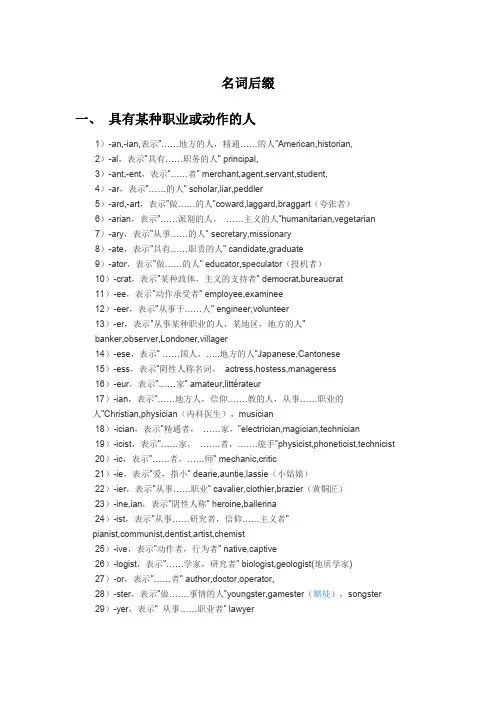
名词后缀一、具有某种职业或动作的人1)-an,-ian,表示"……地方的人,精通……的人”American,historian,2)-al,表示"具有……职务的人" principal,3)-ant,-ent,表示"……者” merchant,agent,servant,student,4)-ar,表示"……的人” scholar,liar,peddler5)-ard,-art,表示"做……的人”coward,laggard,braggart(夸张者)6)-arian,表示"……派别的人,……主义的人”humanitarian,vegetarian7)-ary,表示"从事……的人" secretary,missionary8)-ate,表示"具有……职责的人" candidate,graduate9)-ator,表示"做……的人" educator,speculator(投机者)10)-crat,表示"某种政体,主义的支持者" democrat,bureaucrat11)-ee,表示"动作承受者" employee,examinee12)-eer,表示"从事于……人" engineer,volunteer13)-er,表示"从事某种职业的人,某地区,地方的人"banker,observer,Londoner,villager14)-ese,表示" ……国人,…..地方的人”Japanese,Cantonese15)-ess,表示"阴性人称名词,actress,hostess,manageress16)-eur,表示"……家” amateur,littérateur17)-ian,表示"……地方人,信仰…….教的人,从事……职业的人”Christian,physician(内科医生),musician18)-ician,表示"精通者,……家,”electrician,magician,technician19)-icist,表示"……家,…….者,…….能手”physicist,phoneticist,technicist 20)-ic,表示"……者,……师" mechanic,critic21)-ie,表示"爱,指小" dearie,auntie,lassie(小姑娘)22)-ier,表示"从事……职业” cavali er,clothier,brazier(黄铜匠)23)-ine,ian,表示"阴性人称" heroine,ballerina24)-ist,表示"从事……研究者,信仰……主义者"pianist,communist,dentist,artist,chemist25)-ive,表示"动作者,行为者” native,captive26)-logist,表示"……学家,研究者" biologist,geologist(地质学家)27)-or,表示"……者" author,doctor,operator,28)-ster,表示"做…….事情的人”youngster,gamester(赌徒),songster 29)-yer,表示" 从事……职业者” lawyer二、构成,具有抽象名词的含义1)-acy,表示"性质,状态,境遇" accuracy,diplomacy2)-age,表示"状态,行为,身份及其结果,总称" courage,storage,marriage 3)-al,a) 表示"事物的动作,过程”refusal,arrival,survival,denial,approvalb) 表示具体的事物manual,signal,editorial,journal4)-ance,-ence表示"性质,状况,行为,过程,总量,程度”endurance,importance,diligence,difference,obedience5)-ancy,-ency,表示"性质,状态,行为,过程" frequency,urgency,efficiency, 6)-bility,表示"动作,性质,状态" possibility,feasibility,7)-craft,表示"工艺,技巧” woodcraft,handicraft,statecraft(治国策)8)-cracy,表示"统治,支配" bureaucracy,democracy9)-cy,表示"性质,状态,职位,级别" bankruptcy(破产),supremacy10)-dom,表示"等级,领域,状态" freedom,kingdom,wisdom11)-ery,-ry,表示"行为,状态,习性" bravery,bribery,rivalry12)-ety,表示"性质,状态” variety,dubiety(怀疑)13)-faction,-facture,表示"作成,……化,作用" satisfaction,manufacture14)-hood,表示"资格,身份,年纪,状态" childhood,manhood,falsehood15)-ice,表示"行为,性质,状态" notice,justice,service16)-ine,表示"带有抽象概念" medicine,discipline,famine17)-ing,表示"动作的过程,结果" building,writing,learning18)-ion,-sion,-tion,-ation,-ition,表示"行为的过程,结果,状况"action,solution,conclusion,destruction,expression,correction19)-ise,表示"性质,状态” exercise,merchandise(商业)20)-ism,表示"制度,主义,学说,信仰,行为"socialism,criticism,colloquialism,heroism21)-ity,表示"性质,状态,程度” purity,reality,ability,calamity22)-ment,表示"行为,状态,过程,手段及其结果treatment,movement,judgment,punishment,argument23)-mony,表示"动作的结果,状态" ceremony,testimony24)-ness,表示"性质,状态,程度" goodness,kindness,tiredness,friendliness 25)-or,-our,表示"动作,性质,状态" favor,error,26)-osity,表示"动作,状态” curiosity27)-ship,表示"情况,性质,技巧,技能及身份,职业”hardship,membership,friendship28)-th,表示"动作,性质,过程,状态" depth,wealth,truth,length,growth29)-tude,表示"性质,状态,程度" latitude,altitude(海拔)30)-ure,表示"行为,结果" exposure,pressure,failure,procedure(手续),31)-y,表示"行为的结果,状态,性质” glory,history,victory,inquiry三、带有场所,地方的含义1)-age,表示"住所,地点" village,cottage2)-ary,表示"住所,场地" library,granary (谷仓)3)-ery,ry,表示"工作场所,饲养所,地点" laundry,nursery,surgery(手术室)4)-ory,表示"工作场所,住处" factory,dormitory,laboratory,observatory四、带有学术,科技含义1)-grapy,表示"……学,写法” biography,calligraphy,geography2)-ic,ics,表示"……学……法" logic,mechanics,optics,electronics3)-ology,表示"……学……论”biology,zoology,technology(工艺学)4)-nomy,表示"……学……术" astronomy,economy,bionomy(生态学)5)-ery,表示"学科,技术" chemistry,cookery,machinery6)-y,表示"……学,术,法” photography,philosophy五、表示人和事物的总和,集合含义1)-age,baggage,tonnage2)-dom,newspaperdom(新闻界)3)-hood,neighbourhood,womanhood4)-ery,cavalry,ministry(内阁)5)-ure,legislature,judicature六表示物品和物质名称的含义1)-ant,ent,solvent,constant2)-al,signal,pictorial(画报)3)ar,collar,pillar(石柱)4)- er,boiler,computer,washer,cooker5)-ery,drapery(绸缎)6)-ing,clothing,matting,7)-ment,instrument,equipment,attachment七、表示“细小”的含义1)-cle,particle,2)-cule,molecule(分子)3)-el,parcel4)-en,chicken,maiden5)-et,pocket,ticket6)-etta,-ette,etto,cigarette,essayette(短文)7)-kin,napkin8)-ling,duckling,9)-let,booklet10)-y,baby,doggy。
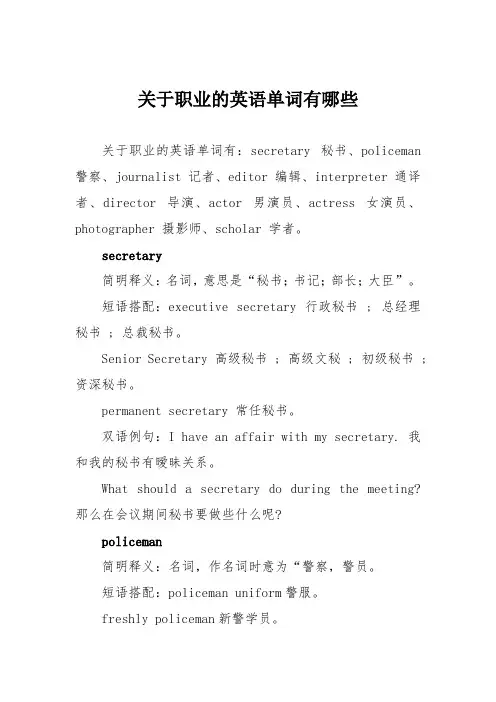
关于职业的英语单词有哪些关于职业的英语单词有:secretary 秘书、policeman 警察、journalist 记者、editor 编辑、interpreter 通译者、director 导演、actor 男演员、actress 女演员、photographer 摄影师、scholar 学者。
secretary简明释义:名词,意思是“秘书;书记;部长;大臣”。
短语搭配:executive secretary 行政秘书 ; 总经理秘书 ; 总裁秘书。
Senior Secretary 高级秘书 ; 高级文秘 ; 初级秘书 ; 资深秘书。
permanent secretary 常任秘书。
双语例句:I have an affair with my secretary. 我和我的秘书有暧昧关系。
What should a secretary do during the meeting? 那么在会议期间秘书要做些什么呢?policeman简明释义:名词,作名词时意为“警察,警员。
短语搭配:policeman uniform警服。
freshly policeman新警学员。
armed policeman武警。
双语例句:We should thank the policeman for his help.我们应该感谢这个警察的帮助。
I like policeman because they have motorcycles.我喜欢警察,因为他们有摩托车。
journalist简明释义:名词,作名词时意为“新闻工作者;报人;记日志者”。
短语搭配:Sports Journalist 体育记者。
Television Journalist 电视记者。
Radio Journalist 电台记者。
双语例句:Journalist, was once one of my dreams.记者,曾经是我的一个梦想。
Every journalist in Africa seemed to be there.非洲的每个记者似乎都在那里。
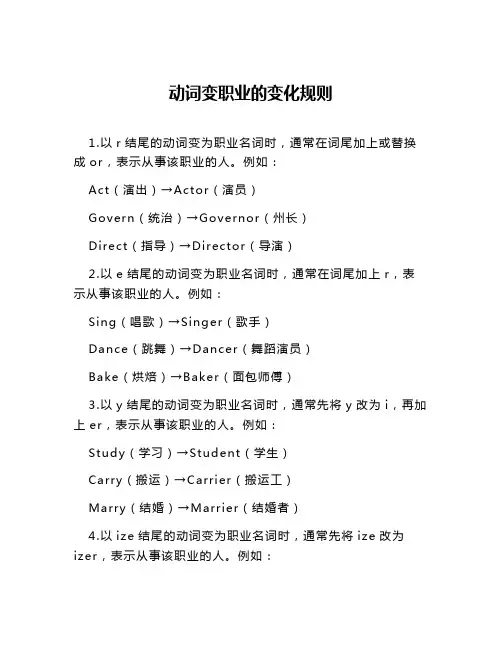
动词变职业的变化规则1.以r结尾的动词变为职业名词时,通常在词尾加上或替换成or,表示从事该职业的人。
例如:Act(演出)→Actor(演员)Govern(统治)→Governor(州长)Direct(指导)→Director(导演)2.以e结尾的动词变为职业名词时,通常在词尾加上r,表示从事该职业的人。
例如:Sing(唱歌)→Singer(歌手)Dance(跳舞)→Dancer(舞蹈演员)Bake(烘焙)→Baker(面包师傅)3.以y结尾的动词变为职业名词时,通常先将y改为i,再加上er,表示从事该职业的人。
例如:Study(学习)→Student(学生)Carry(搬运)→Carrier(搬运工)Marry(结婚)→Marrier(结婚者)4.以ize结尾的动词变为职业名词时,通常先将ize改为izer,表示从事该职业的人。
例如:Organize(组织)→Organizer(组织者)Polarize(使极化)→Polarizer(极化器)Analyze(分析)→Analyzer(分析员)5.以ist结尾的动词变为职业名词时,通常直接去掉ist,表示从事该职业的人。
例如:Dentist(牙医)Pianist(钢琴家)Economist(经济学家)需要注意的是,不是所有的动词都有对应的职业名词形式。
有些职业名词并不是通过动词的变化得到的,而是通过其他方式形成的,如特定的专有名词或者复合词的形式。
此外,还有一些职业名词没有对应的动词形式。
因此,在使用动词表示职业时,需要根据具体情况和语法规则来确定正确的表达方式。
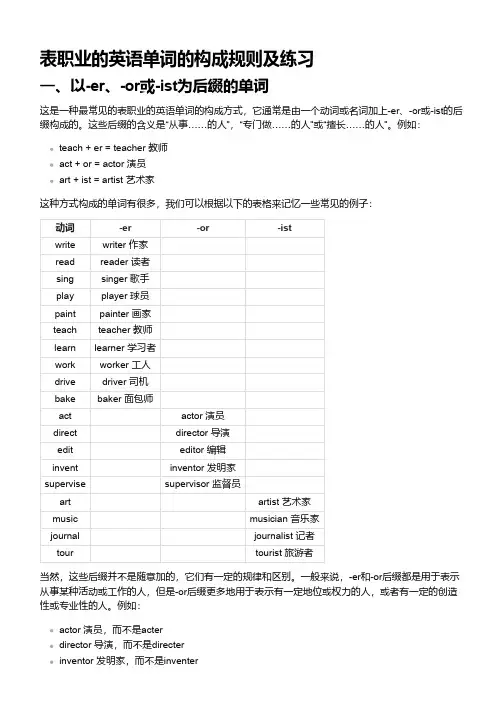
表职业的英语单词的构成规则及练习一、以-er、-or或-ist为后缀的单词这是一种最常见的表职业的英语单词的构成方式,它通常是由一个动词或名词加上-er、-or或-ist的后缀构成的。
这些后缀的含义是“从事……的人”,“专门做……的人”或“擅长……的人”。
例如:teach + er = teacher 教师act + or = actor 演员art + ist = artist 艺术家这种方式构成的单词有很多,我们可以根据以下的表格来记忆一些常见的例子:动词-er-or-istwrite writer 作家read reader 读者sing singer 歌手play player 球员paint painter 画家teach teacher 教师learn learner 学习者work worker 工人drive driver 司机bake baker 面包师act actor 演员direct director 导演edit editor 编辑invent inventor 发明家supervise supervisor 监督员art artist 艺术家music musician 音乐家journal journalist 记者tour tourist 旅游者当然,这些后缀并不是随意加的,它们有一定的规律和区别。
一般来说,-er和-or后缀都是用于表示从事某种活动或工作的人,但是-or后缀更多地用于表示有一定地位或权力的人,或者有一定的创造性或专业性的人。
例如:actor 演员,而不是acterdirector 导演,而不是directerinventor 发明家,而不是inventerartist 艺术家,而不是artertourist 旅游者,而不是tourer另外,有些单词可以加上两种或三种后缀,但是意义会有所不同。
例如:write + er = writer 作家write + or = writer 作者write + ist = writer 作家,但是有时候也指写作主义者,即主张某种写作风格或方法的人sing + er = singer 歌手sing + or = singer 歌唱家,即有一定的声乐技巧或水平的人sing + ist = singer 歌唱家,但是有时候也指歌唱主义者,即主张某种歌唱风格或方法的人二、某些不及物动词本身就代表一种职业,也可以加上后缀构成职业名词这是另一种表职业的英语单词的构成方式,它是由一些不及物动词本身就表示一种职业,也可以加上-er、-or或-ist的后缀构成职业名词。
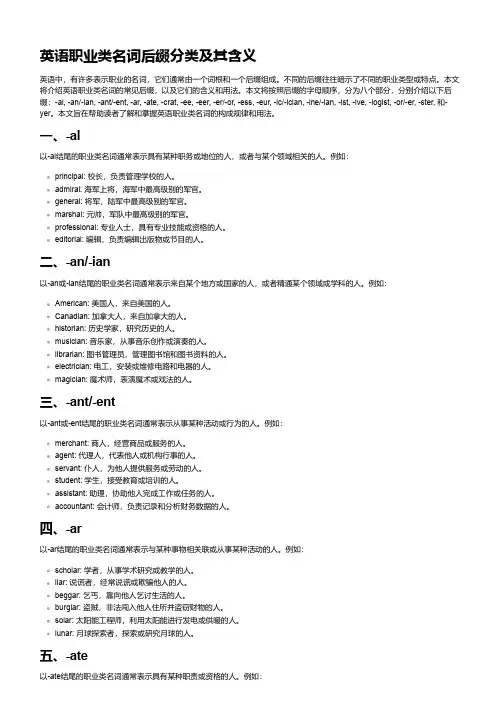
英语职业类名词后缀分类及其含义英语中,有许多表示职业的名词,它们通常由一个词根和一个后缀组成。
不同的后缀往往暗示了不同的职业类型或特点。
本文将介绍英语职业类名词的常见后缀,以及它们的含义和用法。
本文将按照后缀的字母顺序,分为八个部分,分别介绍以下后缀:-al, -an/-ian, -ant/-ent, -ar, -ate, -crat, -ee, -eer, -er/-or, -ess, -eur, -ic/-ician, -ine/-ian, -ist, -ive, -logist, -or/-er, -ster, 和-yer。
本文旨在帮助读者了解和掌握英语职业类名词的构成规律和用法。
一、-al以-al结尾的职业类名词通常表示具有某种职务或地位的人,或者与某个领域相关的人。
例如:principal: 校长,负责管理学校的人。
admiral: 海军上将,海军中最高级别的军官。
general: 将军,陆军中最高级别的军官。
marshal: 元帅,军队中最高级别的军官。
professional: 专业人士,具有专业技能或资格的人。
editorial: 编辑,负责编辑出版物或节目的人。
二、-an/-ian以-an或-ian结尾的职业类名词通常表示来自某个地方或国家的人,或者精通某个领域或学科的人。
例如:American: 美国人,来自美国的人。
Canadian: 加拿大人,来自加拿大的人。
historian: 历史学家,研究历史的人。
musician: 音乐家,从事音乐创作或演奏的人。
librarian: 图书管理员,管理图书馆和图书资料的人。
electrician: 电工,安装或维修电路和电器的人。
magician: 魔术师,表演魔术或戏法的人。
三、-ant/-ent以-ant或-ent结尾的职业类名词通常表示从事某种活动或行为的人。
例如:merchant: 商人,经营商品或服务的人。
agent: 代理人,代表他人或机构行事的人。

人教版六年级上册英语变职业名词规则
英语动词变职业名词规则变化:动词+er、动词+or、动词+or/ress表示有性别之分的职业;动词+man/woman表示有性别之分的职业。
1、动词+er
read(阅读)—reader(读者)
teach(教)—teacher(教师)
report(报道)reporter(记者)
farm(农场)—farmer(农民)
sing(唱歌)—singer(歌手)
work(工作)—worker(工人)
write(书写)—writer(写作)
dance(跳舞)—dancer(舞者)
2、动词+or
collect(收集)——collector(收藏家)
instruct(指导)—instructor(指导者)
direct(管理)—director(经理)
3、动词+or/ress
act(表演)—actor(男演员)
act(表演)—actress(女演员)
instruct(指导)—instructor(男教员)
Instruct(指导)—instructress(女教员)
4、动词+man/woman
police(监督)——policeman(男警察)
police(监督)—policewoman(女警察)
post(邮寄)——postman(邮递员)。
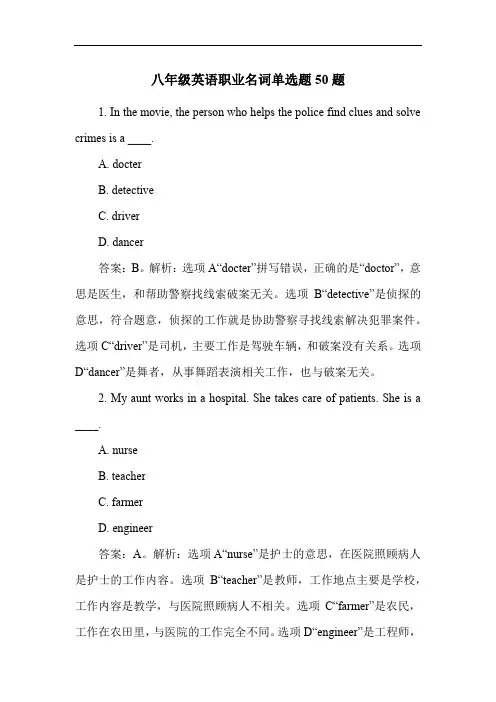
八年级英语职业名词单选题50题1. In the movie, the person who helps the police find clues and solve crimes is a ____.A. docterB. detectiveC. driverD. dancer答案:B。
解析:选项A“docter”拼写错误,正确的是“doctor”,意思是医生,和帮助警察找线索破案无关。
选项B“detective”是侦探的意思,符合题意,侦探的工作就是协助警察寻找线索解决犯罪案件。
选项C“driver”是司机,主要工作是驾驶车辆,和破案没有关系。
选项D“dancer”是舞者,从事舞蹈表演相关工作,也与破案无关。
2. My aunt works in a hospital. She takes care of patients. She is a ____.A. nurseB. teacherC. farmerD. engineer答案:A。
解析:选项A“nurse”是护士的意思,在医院照顾病人是护士的工作内容。
选项B“teacher”是教师,工作地点主要是学校,工作内容是教学,与医院照顾病人不相关。
选项C“farmer”是农民,工作在农田里,与医院的工作完全不同。
选项D“engineer”是工程师,通常在工程建设等领域工作,和医院照顾病人毫无关系。
3. Tom's father builds houses. He is a ____.A. builderB. waiterC. writerD. singer答案:A。
解析:选项A“builder”是建筑工人的意思,建造房子是建筑工人的工作。
选项B“waiter”是服务员,主要工作是在餐厅等场所为顾客服务,和建房子无关。
选项C“writer”是作家,工作是写作,与建房子没有联系。
选项D“singer”是歌手,从事唱歌表演相关工作,和建房子也不相关。
职业名词简称首席执行官【CEO】Chief Executive officer首席品牌官【CBO】chief brand officer首席文化官【CCO】Chief Cultural Officer开发总监【CDO】chief Development officer首席财务官【CFO】Chief finance officer人事总监【CHO】Chief Human resource officer首席信息官【CIO】chief information officer首席知识官【CKO】chief knowledge officer首席市场官【CMO】chief Marketing officer首席谈判官【CNO】chief Negotiation officer首席营运官【COO】chief Operation officer公关总监【CPO】chief Public relation officer质量总监【CQO】chief Quality officer销售总监【CSO】chief Sales officer首席技术官【CTO】chief Technology officer评估总监【CVO】chief Valuation officerCAO:Answerer 首席答辩人,专门负责解答媒体、债权人和用户等有关网站倒闭问题的询问。
CBO:Business Plan 首席商业计划官,是首席财务官的助理之一,专门针对不同的投资人制订相应的BP。
CCO:Cost Control 首席成本控制官,凡超过100元以上的支出必须由CC0批准。
CDO:Domain name 首席域名官,负责公司域名注册、网站清盘时域名的拍卖、域名法律纠纷等相关问题。
CEO:Exchange 首席交换官,一般由国际CEO自由联盟随时更换,是一个常设的短期职能岗位,类似足球教练。
CFO:Financial 首席财务官,公司最重要的领导人,决定公司命运的主要人物。
职业的名词解释英语1. Introduction:In our modern society, the importance of being able to communicate effectively in English cannot be underestimated. With globalization and the rise of multinational corporations, English has become the lingua franca in the business world. Consequently, it is imperative for professionals to have a good command of English, particularly when it comes to understanding and using occupational terms. In this article, we will explore and explain some important professional terms in English, providing a comprehensive understanding of their meanings and usage.2. Expertise:Expertise refers to a person's specialized knowledge or skill in a particular field. It is the result of years of experience, education, and continuous learning. Professionals with expertise in their respective fields are highly sought after and often command higher salaries. For instance, a software engineer with expertise in artificial intelligence is likely to be in high demand due to the increasing importance of this technology in various industries.3. Leadership:Leadership is the ability to guide and motivate a team towards achieving a common goal. A leader should possess qualities such as vision, communication skills, and the ability to make strategic decisions. Effective leadership is crucial in any organization as it ensures the smooth functioning of teams and promotes a positive work environment. Many companies invest heavily in leadership training and development programs to cultivate strong leaders within their ranks.4. Networking:Networking refers to the process of establishing and nurturing professional relationships with others in one's field. Building a strong network of contacts can providenumerous advantages, such as career opportunities, access to valuable information, and professional support. Networking can be done through attending industry events, joining professional organizations, or even utilizing online platforms like LinkedIn. It is an essential skill for professionals looking to expand their reach and enhance their career prospects.5. Work-life balance:Work-life balance refers to the equilibrium between one's professional and personal life. It is the ability to prioritize and manage work commitments while also enjoying personal time and fulfilling personal responsibilities. Achieving work-life balance is important for one's overall well-being and productivity. Professionals who can effectively balance their work and personal lives tend to experience less stress and are generally more satisfied with their careers.6. Entrepreneurship:Entrepreneurship is the process of starting and running a business venture, often involving taking risks and seeking innovative solutions. Entrepreneurs are individuals who identify market opportunities, develop business ideas, and bring them to fruition. They possess qualities such as creativity, resilience, and a willingness to take calculated risks. Many successful entrepreneurs have made significant contributions to their industries and have had a profound impact on society.7. Continuing education:Continuing education refers to the ongoing learning and professional development that takes place after formal education. It involves acquiring new knowledge, enhancing existing skills, and staying updated on the latest trends and advancements in one's field. Continuing education can take various forms, such as attending workshops, participating in online courses, or pursuing advanced degrees. It is important for professionals to continually expand their knowledge and skills to stay competitive in today's rapidly evolving job market.8. Conclusion:Understanding and utilizing professional terms in English is crucial for career success in today's globalized world. The terms discussed in this article, including expertise, leadership, networking, work-life balance, entrepreneurship, and continuing education, are just a few examples of the vast array of professional vocabulary available. By mastering these terms and their meanings, professionals can enhance their communication skills, further their careers, and effectively navigate the complexities of the professional world.。
accountant: 会计actor: 男演员actress: 女演员airline representative: 地勤人员anchor: 新闻主播announcer: 广播员architect: 建筑师artist: 艺术家associate professor: 副教授astronaut: 宇航员. attendant: 服务员auditor: 审计员auto mechanic : 汽车技工baker: 面包师barber: 理发师(男)baseball player: 棒球选手bell boy: 门童bellhop: 旅馆的行李员bin man: 清洁工,垃圾工blacksmith: 铁匠boxer: 拳击手broker (agent) : 经纪人budgeter: 预算编制者bus driver: 公车(巴士)司机butcher: 屠夫,肉商buyer: 采购员carpenter:木匠cartoonist: 漫画家cashier: 出纳员chef: 厨师chemist : 化学师clerk : 店员clown :小丑cobbler: 制(补)鞋匠computer programmer : 程序员construction worker : 建筑工人cook: 厨师cowboy :牛仔customs officer :海关官员dancer : 舞者dentist: 牙科医生designer: 设计师desk clerk: 接待员detective 侦探doctor: 医生door-to-door salesman: 推销员driver: 司机dustman: 清洁工editor : 编辑electrician :电工engineer:工程师farmer: 农夫fashion designer: 时装设计师fireman (firefighter): 消防员fisherman: 渔夫florist: 花商flyer: 飞行员Foreign minister : 外交部长gardener花匠(园丁)gas station attendant : 加油工geologist : 地质学家guard :警卫guide: 导游hiredresseer: 理发师,美容师(女) housekeeper : 管家housewife : 家庭主妇interpreter :口译员janitor : 清洁工journalist: 记者judge 法官lawyer :律师librarian: 图书管理员.life guard :救生员magician :魔术师masseur : 男按摩师masseuse : 女按摩师mathematician : 数学家mechanic: 机械师,机修工miner: 矿工model: 模特儿monk : 和尚,教士movie director: 导演movie star : 电影明星musician : 音乐家nun : 尼姑nurse: 护士office clerk : 职员office staff 上班族operator: 接线员parachutist: 跳伞人.personnel 职员pharmacist药剂师photographer:摄影师pilot: 飞行员planner: 计划员policeman: 警察postal clerk: 邮政人员postman :邮差President: 总统priest: 牧师processfor: 教授real estate agent: 房地产经纪人receptionist :接待员repairman :修理工人reporter : 记者sailor: 船员,水手salesman/ selespeople/ salesperson: 售货员scientist: 科学家seamstress 女装裁缝师secretary: 秘书singer: 歌手soldiery: 士兵,军人statistician : 统计员surveyor: 测量技师tailor: 裁缝师taxi driver计程车司机teacher: 教师technician : 技术人员tour guide: 导游traffic warden: 交通管理员.translator: 翻译(笔译)TV producer: 电视制作人typist: 打字员vet: 兽医veterinarian兽医waiter: 侍者(服务生)waitress: 女侍者(服务生)welder : 焊接工writer: 作家。
play的关于职业的名词解释职业是人们为了谋生或实现自己的个人目标而从事的工作或职责。
在职业中,play这个词经常被用来描述个人在工作环境中的角色扮演和表现。
play作为一个多义词,有多种含义和用法,常常用来解释职业生涯中的不同方面。
首先,play可以表示一个人在职业生涯中扮演的角色。
在一个组织中,每个人都有自己的职责和角色。
一家公司或组织是一个庞大的系统,由不同的部门和职位组成。
例如,在一个公司中,有销售人员、市场营销专员、财务人员、人力资源经理等各种职位。
每个员工都需要play他们的角色,完成自己的工作任务,以保证公司的正常运营。
其次,play还可以表示在职业中的表现和运作方式。
每个人在工作中都有自己的方式和风格。
有些人可能play得非常认真和专注,注重细节和结果。
他们渴望在工作中取得成功并获得更多的发展机会。
另一些人可能choose to play轻松和享乐,注重工作的乐趣和自我实现。
无论是认真专注还是轻松愉快,每个人都有权利自由选择他们play的方式。
此外,play还可以表示在职业中的竞争和竞争对手之间的对抗。
职场上的竞争是常态。
各行各业的从业者为了升职加薪、获得更好的机会,都在不懈努力地争取自己的位置。
他们play自己的才能和能力,努力超越他人。
这种竞争性的play可以激发个人的潜力和动力,推动职业生涯的增长和发展。
此外,在某些特定的职业中,play也可以表示游戏或娱乐活动。
在创意产业、体育领域或娱乐业,行业从业者往往需要通过表演、演艺或竞技来展示自己的才能。
他们play的不仅是一份工作,更是一种创造和娱乐的方式。
这种play可以使人们快乐、满足、充实,并且能够为观众带来欢乐和享受。
然而,尽管play可以有多种含义和用法,我们必须意识到play并不代表游戏或懒散。
它是在工作环境中认真对待职业的一种表现。
play并不意味着只注重娱乐和享乐,而是要在职业中充分发挥个人的潜力和才能,以达到工作的目标和个人的成就。
1、一些由动词变化而来的职业名词:
teach—teacher clean—cleaner sing—singer dance—dancer drive—driver write—writer act—actor act—actress art—artist 2、英文的书信与中文的书信不完全一样:
开头:英语是在人称后面加逗号,中文是加冒号。
正文:英语是顶格写,中文要空两个格。
结尾:英语的落款与人名是顶格而且是分开写的。
中文则是另起一行,放在一起且稍靠后一点儿的地方。
表示时间的介词
口诀:年月周前要用in,遇到几号要用on,上午下午又是in,
要说某日上下午,用on换in才能行。
At : 表示时间概念的某一个点,在某时刻。
例如:at 1:00(noon)在一点钟(中午)
on : 表示具体日期。
例如:They arrived in shanghai on may 25.他们在五月二十五日到达上海。
注:(1)关于"在周末"的几种表示法:
at(on)the weekend 在周末-特指 at(on)weekends 在周末-泛指(2)在圣诞节,应说"at Christmas 而不说"on Christmas
in : 表示月份
例如:I returned to Beijing in the middle of June.我是六月中回北京的。
After : 表示"在(某具体时间)以后"
例如:after supper(8 o’clock)晚饭(八点)后。
表示职业的名词
1.男演员
2.女演员
3.代理人
4.艺术家
5.助手、助理
6.作者,作家
7.作家
8.面包师
9.厨师、炊事员
10.商人
11.女商人
12.船长、队长
13.领导、头
14.主编
15.职员、办事员
16.(汽车)售票员;(火车)列车员
17.顾客、主顾
18.司机,驾驶员
19.牙科医生
20.护士;保育员
21.侦探
22.导演
23.工程师;技师
24.农民,农夫
B 表示食物和饮料的名词
1.水果;果实
2.苹果
3.香蕉
4.橘子,橙
5.桃子
6.梨
7.菠萝
8.蔬菜
9.卷心菜
10.番茄,西红柿
11.萝卜
12.土豆,马铃薯
13.蘑菇
14.渔夫,渔民
15.消防队员
16.中小学校长
17.教师
18.记者,新闻工作者
19.记者
20.裁判;审判员;法官
21.律师
22.国王
23.皇后,女王
24.图片管理员
25.经理
26.班长;监视器
27.官员,办事员
28.诗人
29.飞行员
30.邮递员
31.总统;主席
32.警察
33.科学家
34.秘书
35.士兵;战士
36.待者,服务员
37.女待者;女服务员
38.工作者;工人
39.稻;米;米饭
40.色拉
41.蛋,卵
42.肉
43.猪肉
44.牛排
45.海鲜
46.甜食,小点心
47.饼干
48.面包
49.热狗
50.汉堡包
51.面包。